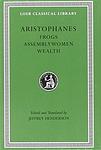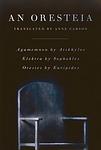The Greatest Greek "Ancient Literature, Fiction" Books of All Time
Click to learn how this list is calculated.
This list represents a comprehensive and trusted collection of the greatest books. Developed through a specialized algorithm, it brings together 305 'best of' book lists to form a definitive guide to the world's most acclaimed books. For those interested in how these books are chosen, additional details can be found on the rankings page.
Genres
Ancient Literature refers to the body of written works produced during the earliest periods of human history, typically up until the fall of the Roman Empire in the 5th century AD. This category encompasses a diverse array of texts, including religious scriptures, epic poetry, philosophical treatises, historical accounts, and dramatic plays, originating from various civilizations such as the Sumerians, Egyptians, Greeks, Romans, Chinese, and Indians, among others. Notable works within this genre include the "Epic of Gilgamesh," Homer's "Iliad" and "Odyssey," the plays of Sophocles and Euripides, the philosophical writings of Plato and Aristotle, the "Mahabharata" and "Ramayana" from India, and the foundational texts of Confucianism and Taoism in China. Ancient literature provides invaluable insights into the thoughts, beliefs, and cultural practices of early societies, and continues to influence modern storytelling, philosophy, and ethics.
Countries
Date Range
Reading Statistics
Click the button below to see how many of these books you've read!
Download
If you're interested in downloading this list as a CSV file for use in a spreadsheet application, you can easily do so by clicking the button below. Please note that to ensure a manageable file size and faster download, the CSV will include details for only the first 500 books.
Download-
1. The Odyssey by Homer
This epic poem follows the Greek hero Odysseus on his journey home after the fall of Troy. It takes Odysseus ten years to reach Ithaca after the ten-year Trojan War. Along the way, he encounters many obstacles including mythical creatures, divine beings, and natural disasters. Meanwhile, back in Ithaca, his wife Penelope and son Telemachus fend off suitors vying for Penelope's hand in marriage, believing Odysseus to be dead. The story concludes with Odysseus's return, his slaughter of the suitors, and his reunion with his family.
The 29th Greatest Book of All Time -
2. The Iliad by Homer
This epic poem focuses on the final weeks of the Trojan War, a conflict between the city of Troy and the Greek city-states. The story explores themes of war, honor, wrath, and divine intervention, with a particular focus on the Greek hero Achilles, whose anger and refusal to fight have devastating consequences. The narrative also delves into the lives of the gods, their relationships with humans, and their influence on the course of events.
The 37th Greatest Book of All Time -
3. Oedipus the King by Sophocles
"Oedipus the King" is a tragic play that revolves around the life of Oedipus, the king of Thebes, who is prophesied to kill his father and marry his mother. Despite his attempts to avoid this fate, Oedipus unknowingly fulfills the prophecy. When he discovers the truth about his actions, he blinds himself in despair. The play explores themes of fate, free will, and the quest for truth, highlighting the tragic consequences of human hubris and ignorance.
The 80th Greatest Book of All Time -
4. Antigone by Sophocles
This ancient Greek tragedy follows the story of Antigone, a young woman who defies the king's edict in order to bury her brother according to their religious customs. The king, her uncle, sentences her to death for her disobedience, leading to a series of tragic events including his own son's suicide. The play explores themes of loyalty, honor, obedience, and the conflict between the laws of the state and the laws of the gods.
The 138th Greatest Book of All Time -
5. The Republic by Plato
"The Republic" is a philosophical text that explores the concepts of justice, order, and character within the context of a just city-state and a just individual. It presents the idea of a utopian society ruled by philosopher-kings, who are the most wise and just. The dialogue also delves into theories of education, the nature of reality, and the role of the philosopher in society. It is a fundamental work in Western philosophy and political theory.
The 142nd Greatest Book of All Time -
6. Medea by Euripides
"Medea" is a Greek tragedy that tells the story of Medea, a former princess of the "barbarian" kingdom of Colchis, and her husband Jason, who leave her to marry Glauce, the daughter of Creon, king of Corinth. In a fit of rage, Medea decides to take revenge on Jason by killing their children, Jason's new wife, and her father, King Creon. The play explores themes of revenge, women's rights, and the dangers of absolute power.
The 218th Greatest Book of All Time -
7. Oedipus at Colonus by Sophocles
"Oedipus at Colonus" is a tragic play that follows the final days of Oedipus, the former king of Thebes. Oedipus, now blind and exiled, arrives at the town of Colonus where he is initially rejected due to the curse that follows him. However, after revealing a prophecy that his burial place will bring prosperity to the city that hosts it, he is allowed to stay. The play explores themes of fate, guilt, and redemption, ending with Oedipus's peaceful death and ascension to a semi-divine status.
The 249th Greatest Book of All Time -
8. Oresteia by Aeschylus
"Oresteia" is a trilogy of Greek tragedies that tells the story of the House of Atreus. It begins with King Agamemnon's return from the Trojan War and his subsequent murder by his wife, Clytemnestra, and her lover, Aegisthus. The second play focuses on the revenge of their son, Orestes, who kills his mother and her lover to avenge his father's death. The final play deals with the trial of Orestes by the gods for the crime of matricide, resulting in his acquittal and the end of the curse on the House of Atreus. The trilogy explores themes of justice, vengeance, and the intervention of the gods in human affairs.
The 250th Greatest Book of All Time -
9. The Bacchae by Euripides
"The Bacchae" is a classic Greek tragedy where the god Dionysus, disguised as a mortal, returns to his birthplace in Greece to punish the impious King Pentheus who denies Dionysus's divine nature and refuses to worship him. The narrative explores themes of revenge, mortality, and the relationship between man and god. Dionysus uses his power to drive the women of the city into a crazed frenzy, leading to a tragic end for King Pentheus and his mother Agave.
The 374th Greatest Book of All Time -
10. Prometheus Bound by Aeschylus
"Prometheus Bound" is a tragedy set in ancient Greece that tells the story of the Titan Prometheus, who defies the gods by giving humans the gift of fire, a symbol of knowledge and civilization. As punishment, Zeus chains Prometheus to a rock in the Caucasus Mountains where he is tormented by a vulture that eats his liver every day, only for it to grow back overnight. Despite his suffering, Prometheus refuses to submit to Zeus' will, embodying the human spirit's unyielding resistance against oppression.
The 484th Greatest Book of All Time -
11. Women of Trachis by Sophocles
This ancient Greek tragedy follows the story of a woman who mistakenly kills her husband, a legendary hero, with a poisoned shirt. She had been given the shirt by a dying centaur who told her it would ensure her husband's loyalty. However, the centaur had actually been fatally wounded by the hero, and the shirt was soaked in the centaur's poisonous blood. The woman kills herself upon realizing her tragic mistake.
The 575th Greatest Book of All Time -
12. Philoctetes by Sophocles
"Philoctetes" is a Greek tragedy that tells the story of a skilled archer abandoned on a deserted island by the Greeks during the Trojan War, due to a foul-smelling wound on his foot. Years later, the Greeks discover a prophecy that they will need Philoctetes and his magical bow to win the war. They send Odysseus and Neoptolemus to retrieve him, leading to a moral dilemma as they must decide whether to deceive the bitter and mistrustful Philoctetes or to persuade him to willingly join their cause. The play explores themes of suffering, deceit, and the struggle between personal integrity and duty.
The 576th Greatest Book of All Time -
13. Ajax by Sophocles
"Ajax" is a classic Greek tragedy that revolves around the character of Ajax, a heroic warrior in the Trojan War who falls into a state of madness and despair when he is passed over for the honor of inheriting the armor of the fallen hero, Achilles. In his fury, Ajax slaughters a flock of sheep, believing them to be his comrades. When he regains his sanity and realizes what he has done, he is filled with shame and ultimately takes his own life. The play explores themes of honor, pride, and the tragic consequences of unchecked rage.
The 577th Greatest Book of All Time -
14. Trojan Women by Euripides
"Trojan Women" is a tragic play set in the aftermath of the Trojan War, focusing on the fate of the women of Troy. The story follows the mother of Hector, Hecuba, and her daughter-in-law, Andromache, as they grapple with the loss of their city and loved ones. They, along with other women, are destined to become slaves to the victorious Greeks. The narrative explores themes of war, suffering, and the resilience of women in the face of adversity.
The 711th Greatest Book of All Time -
15. The Birds by Aristophanes
This ancient Greek comedy play revolves around two men who are fed up with the problems of human society and decide to create a utopian city in the clouds with the help of birds. Their city, 'Cloudcuckooland', becomes popular and attracts gods and humans alike, leading to a series of humorous and satirical events. The play is a satire on political and social life in Athens, poking fun at its democracy, bureaucracy, and warfare.
The 764th Greatest Book of All Time -
16. The Clouds by Aristophanes
"The Clouds" is a satirical play that critiques the intellectual and moral corruption of Athenian society by focusing on a father-son relationship. The father, in an effort to evade debt, sends his son to a school of sophistry to learn the art of manipulating language and logic to win arguments. The story explores themes of education, morality, and the conflict between traditional and modern values. The play is well-known for its critical portrayal of Socrates as a sophist and its comedic elements.
The 807th Greatest Book of All Time -
17. The Persians by Aeschylus
"The Persians" is an ancient Greek tragedy that tells the story of the Persian King Xerxes and his failed invasion of Greece. The narrative focuses on the aftermath of the Battle of Salamis, depicting the mourning of Xerxes' mother and the ghost of his father Darius, who prophesied the fall of the Persian Empire. It serves as a critique of the arrogance and hubris of Xerxes and a celebration of Greek victory, while also exploring themes of war, loss, and the consequences of ambition.
The 825th Greatest Book of All Time -
18. Seven Against Thebes by Aeschylus
"Seven Against Thebes" is a classic Greek tragedy that revolves around the conflict between the two sons of Oedipus, Eteocles and Polynices, who are fighting for the throne of Thebes. The brothers ultimately kill each other in battle, fulfilling their father's curse that they would divide their inheritance by the sword. The play ends with the women of Thebes mourning the death of the brothers and the city in ruins. The tale is a powerful exploration of family loyalty, power struggles and the consequences of destiny and fate.
The 885th Greatest Book of All Time -
19. The Suppliants by Aeschylus
"The Suppliants" is a classic Greek drama that revolves around a group of fifty women who flee from Egypt to avoid marrying their cousins, seeking asylum in the city of Argos. The King of Argos is torn between offering them protection or facing the wrath of the Egyptians. The play explores themes of democracy, law, and the struggle between the sexes. The drama ends on a cliffhanger, with the Egyptian suitors arriving to reclaim the women and threatening war.
The 885th Greatest Book of All Time -
20. The Poems of Sappho by Sappho
This book is a collection of lyric poetry by an ancient Greek female poet, known for her passionate verses on love and relationships. The poems, often composed in the first person, offer a unique insight into the life and emotions of women in antiquity, touching on themes such as desire, jealousy, and personal introspection. Despite many of her works being lost over time, the surviving fragments continue to be celebrated for their vivid imagery and emotional depth.
The 1344th Greatest Book of All Time -
21. Alcestis by Euripides
"Alcestis" is a Greek tragedy that tells the story of a queen who voluntarily chooses to die in place of her husband, the king, when he is fated to die early. The king's friend, Heracles, visits them and, unaware of the queen's death, is offended that he is not being properly entertained. Upon learning the truth, he fights and defeats Death to bring the queen back to life, restoring happiness to the royal household. The play explores themes of love, sacrifice, death, and the power of friendship.
The 1687th Greatest Book of All Time -
22. Discourses Of Epictetus by Epictetus
"Discourses of Epictetus" is a philosophical work that compiles the teachings of the Stoic philosopher Epictetus, as recorded by his pupil Arrian. The text is a practical guide for applying philosophy to daily life, emphasizing ethics, personal freedom, and mental strength. It explores how to live virtuously in accordance with nature, control one's emotions, and maintain tranquility by focusing only on what is within one's control. The discourses delve into discussions about the nature of human beings, the purpose of life, and the path to happiness, offering insights that aim to equip individuals with the resilience and wisdom necessary to lead fulfilling lives.
The 1958th Greatest Book of All Time -
23. The Knights by Aristophanes
"The Knights" is a satirical comedy that delves into the political landscape of ancient Athens, critiquing the city's leadership through the allegory of a household. The play focuses on the conflict between a noble but dimwitted horseman and a cunning and manipulative sausage-seller, both vying for the favor of their master, who represents the Athenian people. The sausage-seller, with the help of the chorus of knights, ultimately triumphs, symbolizing the hope for a new and better leader. The work is a pointed commentary on the demagoguery and corruption of the time, using humor and absurdity to explore themes of power, populism, and the responsibilities of citizenship.
The 2400th Greatest Book of All Time -
24. The Assemblywomen by Aristophanes
In this ancient Greek comedy, the women of Athens, fed up with the mismanagement and corruption of male politicians, disguise themselves as men to take over the city's assembly. Once in power, they institute a series of radical reforms, including the communal sharing of wealth and property, and the requirement that the most attractive men must sleep with the ugliest women first to ensure fairness in love. The play satirizes gender roles, political life in Athens, and the utopian solutions to societal problems, all while delivering a humorous yet pointed critique of the effectiveness of democratic governance and the nature of power.
The 4082nd Greatest Book of All Time -
25. Orestes by Euripides
The play centers around Orestes, who, after obeying the god Apollo's command to avenge his father Agamemnon's murder by killing his mother Clytemnestra and her lover Aegisthus, is tormented by the Furies and rejected by his community. Facing execution, Orestes, along with his sister Electra and friend Pylades, concocts a desperate plan for survival that includes the potential murder of Helen, the wife of his absent brother Menelaus, and the taking of her daughter Hermione as a hostage. The play explores themes of justice, revenge, and the complexities of familial loyalty, culminating in a divine intervention that offers a resolution to Orestes' plight.
The 4151st Greatest Book of All Time
Reading Statistics
Click the button below to see how many of these books you've read!
Download
If you're interested in downloading this list as a CSV file for use in a spreadsheet application, you can easily do so by clicking the button below. Please note that to ensure a manageable file size and faster download, the CSV will include details for only the first 500 books.
Download























